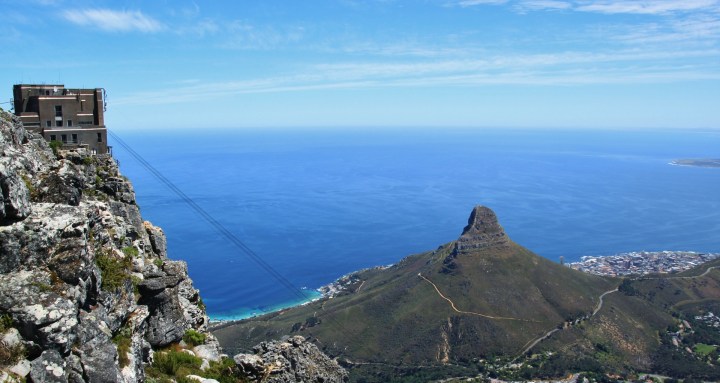OP-ED
Covid-19 gives tourism a ‘snotklap’: Lessons for a climate-altered future

South Africa’s ‘new gold’ industry – tourism – is one of the first to feel the shockwaves of the Covid-19 global economic shutdown. This is a forewarning of what’s to come as the global economy begins its inevitable and rapid decarbonisation in order to slow climate collapse. The coronavirus is a reminder that we can either plan for this change, or be sunk by it.
When hiking guide Fatima Sait headed off into the Cape mountains on Monday, 9 March, business was ticking over nicely after a good summer season. Without phone reception, she had no idea that everything was about to change. When she logged back on to her social media feeds four days later, she had returned to a very different world.
The 44-year-old freelance guide from Lotus River in the Cape Town suburbs was in “total shock” as she picked up on the industry buzz: other guides and tour operators were reporting mass cancellations, particularly from foreign visitors. Her own clients – also mostly international bookings – were cancelling their trips.
Two weeks later, with global travel ground to a halt and South Africa approaching lockdown to contain the spread of the Covid-19 virus, Sait’s work diary for the next two months was suddenly empty, except for one local booking in April which is up in the air.
“I have no income coming in for the next few weeks. The entire industry is in the same boat – not just tourism but events companies too.”
Sait has some savings tucked away and might be able to support herself for about three months, but after that, who knows?
“I might start making koeksisters (a Cape Malay sweet delicacy), and sell them in my community,” she says.
Down in Simon’s Town on the Cape Peninsula, Gary and Sharon Leih’s high-end bed-and-breakfast business was recovering nicely from the post-Day Zero slowdown, when many international guests cancelled their bookings because of concerns about water shortages in the city during the 2018 drought crunch.
Business was down about 35% during the Day Zero crisis, says Gary Leih, but compared with that, the coronavirus has given them a “snotklap”. With tourist cancellations rolling in across the industry, in March the Leihs decided to close the guest house indefinitely, along with another luxury self-catering apartment business.
“We employ five people full-time, a gardener, two cleaners, a meet-and-greet person, and a handyman,” says Leih. All their staff have been sent home on full pay for a month, with two returning to the Eastern Cape to wait things out.
With both properties already paid off, and some savings to lean on, the Leihs’ main overheads are salaries, and basic running costs such as electricity and water.
“We will monitor the situation, but we’re not taking any more bookings until August. If we can’t reopen then, we’ll be in serious trouble.”
But, for many other tourism businesses which might not have savings to tide them over until international travel resumes, going under might be the only option. Some small businesses who were approached by Daily Maverick were unable to comment, as they were crisis-managing businesses which overnight had gone from being relatively stable operations to facing potential bankruptcy.
SA’s ‘new gold’ among first to feel economic shock of global travel restrictions
Another tour operator who spoke to Daily Maverick and who asked not to be named said this week that he was already in the process of retrenching six of his 15-strong team, while negotiating pay cuts with the rest. The owners won’t be taking salaries for the next while, he said.
This tour outfit usually has over a thousand bookings in a year, mostly international guests from the US, Canada, Europe, and China who they take on tours across southern and East Africa. But bookings have “dwindled to a trickle” this March.
The full cost of the economic shock of Covid-19 containment efforts for tour operators like this, and their staff, can only be counted once the crisis has passed. But the impact of closing borders following the government’s declaration of a national disaster on 15 March has already been huge, says Sabine Lehmann, former managing director for the Table Mountain Aerial Cableway Company and now an independent visitor attraction specialist with a special focus on future trends in the sector.
According to 2018 figures from the World Travel and Tourism Council (WTTC), tourism contributes 8.6% to South Africa’s total economy, amounting to R425.5-billion. The sector employs 1.5 million people, 9.2% of the country’s total employment. South Africa’s tourism is particularly reliant on international visitors – for every R1 spent here by a domestic tourist, R3 is spent by an international tourist.
“Our industry is highly seasonal, though, and heavily reliant on the six summer months of tourism,” says Lehmann. “Cutting the tourism season short has significant impacts on cash flow. Many will not be able to survive even a short, sharp shock like this. I have already come across a number of businesses that have immediately laid off 50% of their workers, with the others put on standby.”
Seasonal workers in the industry may be among the most at risk. Summer tourism jobs would already be coming to an end now, worsened by the Covid-19 shut-down, and the struggling industry may not be able to absorb the same number of jobs next season.
There were a range of responses immediately following the declaration of the national disaster from some of the country’s big draw-card attractions, says Lehmann. Some instituted complete closures until after Easter, such as the Table Mountain Cableway, Two Oceans Aquarium, and the Zeitz MOCAA art gallery. Others, like uShaka Marine World in eThekwini, cut their offerings by closing high-risk areas. Others decided to stay open but with extra hygiene measures in place, such as SANBI’s Pretoria Zoo and Kirstenbosch Gardens. All this changed once the countrywide lockdown kicked into play on 26 March, and it is impossible to predict when these will reopen, in part or in full, should the lockdown be lifted on 16 April.
Pandemics end, the climate crisis is here to stay
Once the pandemic has finally been contained, global travel is likely to slowly recover, allowing the sector to get back on track to meet what the government hopes will be a growing potential to create more jobs and boost small and medium businesses.
“Government has described tourism as the country’s ‘new gold’,” says Lehman. “During the State of the Nation address, President Cyril Ramaphosa said the goal was to double international tourism arrivals to 21 million by 2030.”
But will this be possible in a world that wakes up to the fact that the global economy must decarbonise rapidly to avert continued climate breakdown? The next decade will see rapid economic shifts as governments and businesses bend to growing pressure to bring carbon pollution levels down to meet the targets set out by the United Nations Paris Agreement, which aims to stabilise global heating at 2°C or lower, relative to pre-industrial temperatures.
The goal of the 2020 annual UN climate negotiations — which should take place in Glasgow in Scotland towards the end of the year, Covid-19 depending — is for governments to come up with carbon pollution reduction plans that can be actioned. Collectively, these should aim to bring global emissions down by 45% by 2030, and to net-zero by 2050.
While the private sector won’t be held to these targets through the same legal UN mechanisms as governments will, it will be compelled to follow suit because of a changing zeitgeist that will increasingly penalise carbon-intensive industries. The rapid capital flight from fossil-fuel-intensive industries is already beginning to steer progressive financiers, banks, and insurers away from these increasingly risky fossil fuel investments.
International air travel only contributes to just over 2% of global greenhouse gas pollutants, but it is growing when many other polluting sectors are aiming to green themselves quickly. According to the International Council on Clean Transportation, air travel-related carbon dioxide grew by 32% from 2013 to 2018, the equivalent of building about 50 coal-fired power plants. Air travel is also one of the transport sectors with fewer scalable clean energy options on the immediate horizon, such as biofuels from sugar or algae. Unlike electric vehicles that can be powered by a renewable electricity grid, air flight technology is largely still reliant on fossil fuel for the near future.
When analysts talk about the risks relating to climate collapse, they’re not just talking about the impact of climate change itself, they’re talking about the “transition risks” that they need to prepare for as the global economy restructures itself away from carbon polluting processes.
The impact of climate collapse on the tourism industry won’t just be measured in the damage caused by rising temperatures and extreme weather events, which will hit tourism infrastructure, damage biodiversity, and slow visitor numbers. It will be hit by the same economic shockwaves that have smashed through the industry in the way that the Covid-19 pandemic has.
In 2014, the University of Hawaii’s Center for Futures Studies did a thought experiment, imagining four “alternative futures” to help organisations plan better in the midst of such global uncertainty: business-as-usual continuation; collapse; discipline, and transformation.
Applying these to the South African tourism sector, by Lehmann’s estimate, “business-as-usual” growth is unlikely. Collapse is a “real possibility” as international travel throttles down and local tourism spend gets hit. “Business with new rules” is an option, where the industry builds its remote and online conferencing businesses, and leans more on domestic or Sadec-level travel, day-tripping, and local spending potential.
No one was able to speculate as to how long it will take for tourism to find its feet again, once the coronavirus is contained. But the crisis shows just how vulnerable this sector is to a world where international luxury travel may no longer be possible, either through economic decline or restrictions on non-essential forms of carbon polluting travel.
The unnamed tour operator who has cut his staff by half and grappling with how to keep the rest of the business afloat for the next few months said he hoped this slowdown would be temporary.
“But we don’t have any guarantees. If demand bounces back, we hope to be able to employ the same people again. But if there’s reduced tourism because of a global depression and people don’t have as much money for travel, demand could be permanently lowered. If so, it’s hard to see ourselves getting back to the same size and numbers.” DM
"Information pertaining to Covid-19, vaccines, how to control the spread of the virus and potential treatments is ever-changing. Under the South African Disaster Management Act Regulation 11(5)(c) it is prohibited to publish information through any medium with the intention to deceive people on government measures to address COVID-19. We are therefore disabling the comment section on this article in order to protect both the commenting member and ourselves from potential liability. Should you have additional information that you think we should know, please email [email protected]"



















